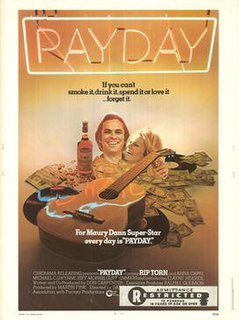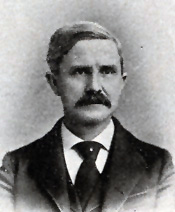Notes
- ↑ "Col. Henry Charles DeAhna, (USA)". geni.com. Retrieved February 21, 2018.
- ↑ "U.S. States A-D".
Henry Charles [1] DeAhna (born ca. 1823/1826, died 1891) was a collector of customs for the United States Department of the Treasury, and from August 14, 1877, to March 26, 1878, was the highest-ranking federal official in the Department of Alaska, making him the de facto governor of the territory. [2]

The 15th United States Congress was a meeting of the legislative branch of the United States federal government, consisting of the United States Senate and the United States House of Representatives. It met in the Old Brick Capitol in Washington, D.C. from March 4, 1817, to March 4, 1819, during the first two years of James Monroe's presidency. The apportionment of seats in the House of Representatives was based on the Third Census of the United States in 1810. Both chambers had a Democratic-Republican majority.

Payday is a 1973 American drama film written by Don Carpenter, directed by Daryl Duke, and starring Rip Torn as a country music singer. Other members of the cast include Ahna Capri, Elayne Heilveil, and Michael C. Gwynne. The picture was filmed in and around Selma, Alabama.

The 56th United States Congress was a meeting of the legislative branch of the United States federal government, composed of the United States Senate and the United States House of Representatives. It met in Washington, D.C. from March 4, 1899, to March 4, 1901, during the third and fourth years of William McKinley's presidency. The apportionment of seats in this House of Representatives was based on the Eleventh Census of the United States in 1890. Both chambers had a Republican majority. There was one African-American member, George Henry White of North Carolina, who served his second and final term as a Representative in this Congress, and would be the last black member of Congress until 1928, and the last black member of Congress from the South until 1972.

The 57th United States Congress was a meeting of the legislative branch of the United States federal government, composed of the United States Senate and the United States House of Representatives. It met in Washington, DC from March 4, 1901, to March 4, 1903, during the final six months of U.S. President William McKinley's presidency, and the first year and a half of the first administration of his successor, U.S. President Theodore Roosevelt. The apportionment of seats in the House of Representatives was based on the Eleventh Census of the United States in 1890. Both chambers had a Republican majority.

The 61st United States Congress was a meeting of the legislative branch of the United States federal government, composed of the United States Senate and the United States House of Representatives. It met in Washington, DC from March 4, 1909, to March 4, 1911, during the first two years of William H. Taft's presidency. The apportionment of seats in the House of Representatives was based on the Twelfth Census of the United States in 1900. Both chambers had a Republican majority.

The 60th United States Congress was a meeting of the legislative branch of the United States federal government, composed of the United States Senate and the United States House of Representatives. It met in Washington, DC from March 4, 1907, to March 4, 1909, during the last two years of Theodore Roosevelt's presidency. The apportionment of seats in the House of Representatives was based on the Twelfth Census of the United States in 1900. Both chambers had a Republican majority.

The 64th United States Congress was a meeting of the legislative branch of the United States federal government, composed of the United States Senate and the United States House of Representatives. It met in Washington, DC from March 4, 1915, to March 4, 1917, during the third and fourth years of Woodrow Wilson's presidency. The apportionment of seats in the House of Representatives was based on the Thirteenth Census of the United States in 1910.

The 62nd United States Congress was a meeting of the legislative branch of the United States federal government, composed of the United States Senate and the United States House of Representatives. It met in Washington, DC from March 4, 1911, to March 4, 1913, during the final two years of William H. Taft's presidency.

The 63rd United States Congress was a meeting of the legislative branch of the United States federal government, composed of the United States Senate and the United States House of Representatives. It met in Washington, D.C. from March 4, 1913, to March 4, 1915, during the first two years of Woodrow Wilson's presidency. The apportionment of seats in the House of Representatives was based on the Thirteenth Census of the United States in 1910.

The 58th United States Congress was a meeting of the legislative branch of the United States federal government, composed of the United States Senate and the United States House of Representatives. It met in Washington, DC, from March 4, 1903, to March 4, 1905, during the third and fourth years of Theodore Roosevelt's presidency. The apportionment of seats in the House of Representatives was based on the Twelfth Census of the United States in 1900. Both chambers had a Republican majority.

The 59th United States Congress was a meeting of the legislative branch of the United States federal government, composed of the United States Senate and the United States House of Representatives. It met in Washington, D.C. from March 4, 1905, to March 4, 1907, during the fifth and sixth years of Theodore Roosevelt's presidency. The apportionment of seats in the House of Representatives was based on the Twelfth Census of the United States in 1900. Both chambers had a Republican majority.

Pauline Maria de Ahna (also known as Pauline Strauss was a German operatic soprano and the wife of composer Richard Strauss. Her singing career was closely tied to her husband's career as a conductor and composer. From 1890–1894 she was committed to the Staatskapelle Weimar and from 1894–1897 she was committed to the Bavarian State Opera, during which times her husband was the principal conductor of those theaters. She also sang under her husband's baton at the Bayreuth Festival and in the world premiere of his first opera Guntram. Other houses at which performed included the Berlin State Opera, La Monnaie, and the Liceu. Her repertoire included leading roles in the operas of Beethoven, Humperdinck, Mozart, von Weber, and Wagner. After she gave birth to their son, Franz Strauss in 1897, she retired from the opera stage. She thereafter continued to periodically perform in concerts of her husband's music, particularly lieder. Strauss credited her as his muse for many of his compositions, including the title role in Salome, the Countess Madeleine in Capriccio, and the Four Last Songs among others.

Charles Lewis Henry was a U.S. Representative from Indiana.
Anna Marie Nanasi, better known by her professional name Ahna Capri, was an American film and television actress best known for her role as Tania in the martial-arts film Enter the Dragon.
Charles Henry Oldfather was an American professor of history of the ancient world, specifically at the University of Nebraska-Lincoln. He was born in Tabriz, Persia.

Ahna O'Reilly is an American actress. She is best known for her role in the film The Help (2011).
The 1908 Birthday Honours for the British Empire were announced on 28 June, to celebrate the birthday of Edward VII.

Eleonore de Ahna, occasionally also Leonore de Ahna, was a German operatic soprano/mezzo-soprano.

Heinrich de Ahna was an Austrian violinist.